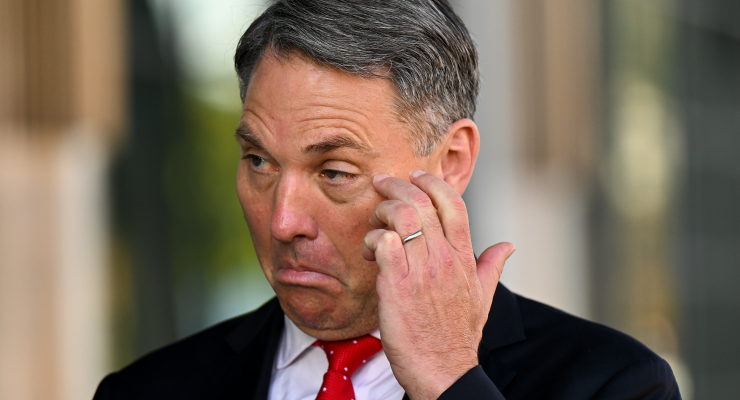
The mystery of who hosted Richard Marles to a round of golf at an exclusive US golf club before AUKUS talks last year has deepened as the defence minister’s office claims it has no record of the identity of his benefactor.
Marles’ office responded to an FOI request late last week by saying it had no documents which would identify the club member’s name.
The FOI request was lodged by transparency website Open Politics after Marles’ office had refused to say who hosted him before talks in Washington with UK and US officials on the terms of Australia’s engagement in the $368 billion nuclear submarine agreement.
Open Politics’ Sean Johnson asked for “any documents that would identify the club member’s name … These documents could include the minister’s diary entry for 4 December 2022 (only the part that identifies the club member’s name) and any briefing documents about his meeting with the club member.”
Marles’ office also refused to answer Crikey‘s question about who the host was for a story we published last month.
As we reported, the Baltusrol golf club in New Jersey is regularly ranked among the top five US courses. Membership is by invitation only. Joining fees are US$150,000. Annual fees are US$18,500. A single round costs US$125. Baltusrol’s board of governors is drawn from the ranks of top-drawer attorneys and investment bankers.
Marles’ persistent refusal to say who hosted him at the club defies the federal Parliament’s transparency regulations.
In his parliamentary register of interests, Marles has declared the following under the category of hospitality: “A round of golf at the Baltusrol Golf Club (USA), hosted by a member of Baltusrol Golf Club on 4 December 2022.” Yet he has since frustrated the accountability purpose of the register by refusing to say who provided the hospitality.
Marles’ refusal may also contravene the Albanese government’s code of ministerial conduct which stipulates in section 3.3 that “ministers must declare and register their personal interests, including but not limited to pecuniary interests, as required by the Parliament from time to time”.
Whatever else it does, the deputy prime minister’s secrecy raises an obvious question: what does he have to hide? It is a vital question for a minister who is in charge of Australia’s national security and the nation’s largest defence commitment.
If the answer is benign it would be good to know. In the meantime Open Politics has applied for a review of the FOI decision.
If you have any information on this story please contact David Hardaker via dhardaker@protonmail.com








Because he wrote a little book, published by Monash University, about Australia’s South Pacific neighbours, my impression of Marles was that he must be an independent thinker. I did buy it but never actually read it. But since the appalling AUKUS decision I have come to see him as just a bit greasy. His witterings about sovereignty are just rhubarb, like twit conservatives everywhere. Shame..
So it’s not just half the Australian population that thinks AUKUS is dodgy – Marles obviously thinks so too. Otherwise why the cover-up?
only half?
My guess is either General Dynamics Electric Boat Company or Huntington Ingalls Industries, or both. Perhaps Pyne and Hocking also joined him for the round?
Adam Bandt or one of the teals should ask him in Question Time, pointing out the requirement for him to do so.
I can’t believe this crap. Stonewalling us.
Telling us we’ve got no business sniffing around a quarter trillion deal?
Time for his head. We voted out the filth who stonewalled us, and this guy’s boss promised us his mob were different.
Let the red mist descend. Shred these piss-taking impostors.